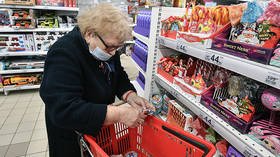‘Help people survive, not starve’ – Russian charity tests new virtual food card to help victims of coronavirus economic hardship

A new benefit card is being rolled out in some Russian cities, aimed at helping people buy food when their income has been reduced by the Covid-19 pandemic.
The initiative, launched by the ‘Rus’ charitable fund and the Krasnodar-based Magnit chain of stores, will offer shoppers up to 1,000 points each month to spend on groceries. The scheme has also received support from President Vladimir Putin’s All-Russian Popular Front political coalition. The initial roll-out has taken place in St Petersburg, in Vladimir, near Moscow, and in the southern city of Rostov.
Speaking to Ekaterinburg-based Znak, Rus Foundation’s Vice President Anna Aliyeva-Khrustaleva said that the goal of the project “is to enable people to survive, and not to starve.” She explained that the cards are not physical, as previous ‘ration cards’ were, but virtual, to help ensure compliance with “coronavirus, and the associated restrictions. To connect to the program,” she added, “people did not need to personally come to institutions, sign documents and so on. All of this is done online.”
Also on rt.com With Sputnik V, Russia takes on Western Big Pharma giants in fight for multi-billion-dollar global Covid-19 vaccine businessAccording to the charity, 1,000 families have already signed up to receive points, which can be spent on “essential goods,” including cereals, pasta, flour, vegetable oil, canned food, tea, dairy products, sugar, salt, vegetables and fruits. Participants can’t use the cards to buy alcohol or tobacco, and fresh fish and meat are also ineligible, given their relatively higher cost. The points equate to 1,000 roubles ($13) which, Aliyeva admitted, "is a drop in the ocean, but it does still help.“
International organizations have warned that the coronavirus pandemic is causing a global rise in food poverty. Recent estimates suggest that as many as 132 million people worldwide could find themselves becoming unable to get enough food to meet their nutritional requirements.
Vladimir Putin had previously set a target to halve levels of food poverty in Russia by 2024 but, in July, pushed that target back to 2030. His spokesman, Dmitry Peskov, said that this was due to “unfavorable world economic conditions that will slow the development of all countries without exception.”
Think your friends would be interested? Share this story!














